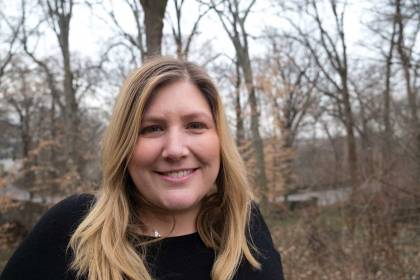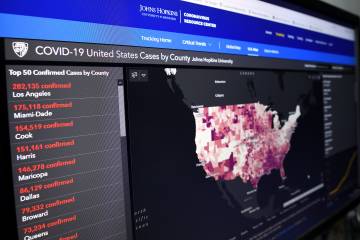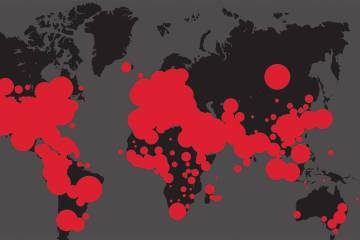As a little girl, Beth Blauer wanted more than anything to be an astronaut like her hero Sally Ride.
The space shuttle Challenger disaster changed that.
"It was the first time in my life where I realized that things were going to happen that were outside of my control and I was going to have to figure out a different path forward," said Blauer, executive director for the Johns Hopkins Centers for Civic Impact, during a keynote address at the MBA Summit hosted by the Johns Hopkins Carey Business School on Nov. 13. "I knew that day that I did not want to be an astronaut anymore."

Image caption: Beth Blauer
Instead, she set her sights on a career as a public defender to help those in need. But before she could enter the public sector, she first had to tackle the mountain of law school debt she had accumulated, so she took a temporary job at a Wall Street hedge fund, where she worked in the World Trade Center.
On Sept. 10, 2001, the day after she returned to work from her honeymoon, Blauer broke her foot. While meeting with an orthopedic surgeon the next day, two planes crashed into her workplace in the single deadliest terror attack in history.
It shook her to her core. But the terror and grief she experienced—both as a child watching the space shuttle explode and as an adult in New York City living through the 9/11 terror attacks—also filled Blauer with a sense of purpose.
"I needed to not put off the things that I wanted to do in my career. … I was on borrowed time," she said.
Blauer's story of disruption and adaptation is one that resonated with Carey MBA students who attended the summit—a conference organized by the school's Career Development Office as a marquee campus event that gathered 177 prospective, current, and former MBA students with potential employers and professional contacts.
"Beth Blauer's keynote speech made the MBA Summit," wrote one summit attendee in an event evaluation survey. "It brought forth the emotion and data and career advice and career modeling/example everyone could have hoped for."
Added another: "I thoroughly enjoyed the keynote speaker's presentation about life disruptions coming at all the wrong times. ... There is never a convenient time or a right time, but how you choose to deal with those moments of disruption makes you stronger and better!"
The event was held in person last year, but the ongoing coronavirus pandemic forced summit organizers to think creatively about virtual programming for 2020. Fittingly, the summit's theme this year was "Disruption."
For the organizers, the decision to invite Blauer to deliver the keynote address was obvious, not only because her career has spanned the private and public sectors (and thus she could provide valuable insights to MBA students), but also because she has spent much of the past year as a core team member working on the university's Coronavirus Resource Center website—a leading public health data visualization tool for combating a devastating global public health crisis. The website was recently named a 2020 Best Invention by TIME.
"Since March of 2020, our lives have been disrupted, both personally and professionally, in unimaginable ways. Beth's message of personal and professional growth through disruption, while sticking to her values, is exactly what I hope attendees heard to inspire hope for a future of growth for themselves and our communities," says Christy Murray, assistant dean for career development at Carey.
Blauer's pivot from directing the Centers for Civic Impact to helping drive the Coronavirus Resource Center builds on early career decisions she made a decade and a half ago.
While working for the state of Maryland in the early 2000s, Blauer said, she became an early advocate for the Department of Juvenile Services to make data- and evidence-based decisions for the families and children it served. As her career progressed, she eventually oversaw 85% of the state's budget and workforce and worked to address challenges of infant mortality, violence, and the environmental health of the Chesapeake Bay, among other prominent state issues.
Then the Great Recession hit, Blauer said. She led the creation of a tracker map that recorded where every dollar provided to the state by the American Recovery and Reinvestment Act was spent. That economic recovery data was overlaid with the employment and investment needs of Maryland residents to ensure resources were being allocated to regions where need was greatest. The strategy was so effective that the federal government adopted Maryland's approach.
Blauer joined Johns Hopkins in 2015 when she helped launch the Center for Government Excellence—just one day after her husband died from lung cancer. The center's founding, following so soon on the heels of great personal loss, represented the culmination of Blauer's career in public service, data, and the private sector, as well as the most challenging moment of disruption she ever had to overcome.
This year, as the coronavirus began spreading internationally, Blauer reached out to the university to partner with a team led by civil engineer Lauren Gardner on a tool that would combine coronavirus cases and fatalities with information about policy initiatives, health outcomes, and testing data. She's been part of the Coronavirus Resource Center's core team ever since.
"We know what needs to happen, and we're using data at Johns Hopkins University to influence that discussion and to make sure that our public policymakers have the best information, but also that we as individuals have that information, too," she said.
The truth is, Blauer said, everyone faces disruption, whether from widespread public health or economic crises or from personal loss and bereavement. It's how we respond to that disruption—how we overcome the adversity we face—that is at the core of who we are. She urged the MBA students in attendance to see the current pandemic and the looming economic crisis as opportunities to refine and recommit to their goals.
"I challenge you all to start thinking about … how you, too, can use this moment of disruption to define what the next period of your life will be," she said.
Posted in University News, Voices+Opinion
Tagged faculty, center for government excellence, centers for civic impact










